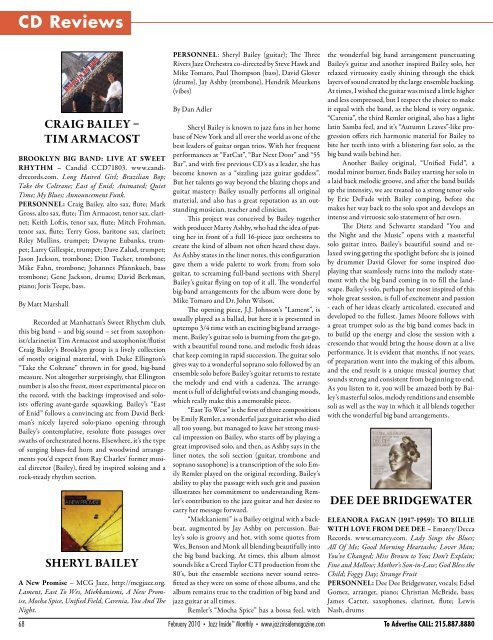February 2010 issue - Jazz Singers.com
February 2010 issue - Jazz Singers.com
February 2010 issue - Jazz Singers.com
Create successful ePaper yourself
Turn your PDF publications into a flip-book with our unique Google optimized e-Paper software.
CD Reviews<br />
CRAIG BAILEY –<br />
TIM ARMACOST<br />
BROOKLYN BIG BAND: LIVE AT SWEET<br />
RHYTHM – Candid CCD71803. www.candidrecords.<strong>com</strong>.<br />
Long Haired Girl; Brazilian Bop;<br />
Take the Coltrane; East of Enid; Animated; Quiet<br />
Time; My Blues; Announcement Funk.<br />
PERSONNEL: Craig Bailey, alto sax, flute; Mark<br />
Gross, alto sax, flute; Tim Armacost, tenor sax, clarinet;<br />
Keith Loftis, tenor sax, flute; Mitch Frohman,<br />
tenor sax, flute; Terry Goss, baritone sax, clarinet;<br />
Riley Mullins, trumpet; Dwayne Eubanks, trumpet;<br />
Larry Gillespie, trumpet; Dave Zalud, trumpet;<br />
Jason Jackson, trombone; Dion Tucker, trombone;<br />
Mike Fahn, trombone; Johannes Pfannkuch, bass<br />
trombone; Gene Jackson, drums; David Berkman,<br />
piano; Joris Teepe, bass.<br />
By Matt Marshall<br />
Recorded at Manhattan’s Sweet Rhythm club,<br />
this big band – and big sound – set from saxophonist/clarinetist<br />
Tim Armacost and saxophonist/flutist<br />
Craig Bailey’s Brooklyn group is a lively collection<br />
of mostly original material, with Duke Ellington’s<br />
“Take the Coltrane” thrown in for good, big-band<br />
measure. Not altogether surprisingly, that Ellington<br />
number is also the freest, most experimental piece on<br />
the record, with the backings improvised and soloists<br />
offering avant-garde squawking. Bailey’s “East<br />
of Enid” follows a convincing arc from David Berkman’s<br />
nicely layered solo-piano opening through<br />
Bailey’s contemplative, resolute flute passages over<br />
swaths of orchestrated horns. Elsewhere, it’s the type<br />
of surging blues-fed horn and woodwind arrangements<br />
you’d expect from Ray Charles’ former musical<br />
director (Bailey), fired by inspired soloing and a<br />
rock-steady rhythm section.<br />
SHERYL BAILEY<br />
A New Promise – MCG <strong>Jazz</strong>, http://mcgjazz.org.<br />
Lament, East To Wes, Miekkaniemi, A New Promise,<br />
Mocha Spice, Unified Field, Carenia, You And The<br />
Night.<br />
PERSONNEL: Sheryl Bailey (guitar); The Three<br />
Rivers <strong>Jazz</strong> Orchestra co-directed by Steve Hawk and<br />
Mike Tomaro, Paul Thompson (bass), David Glover<br />
(drums), Jay Ashby (trombone), Hendrik Meurkens<br />
(vibes)<br />
By Dan Adler<br />
Sheryl Bailey is known to jazz fans in her home<br />
base of New York and all over the world as one of the<br />
best leaders of guitar organ trios. With her frequent<br />
performances at “FatCat”, “Bar Next Door” and “55<br />
Bar”, and with five previous CD’s as a leader, she has<br />
be<strong>com</strong>e known as a “sizzling jazz guitar goddess”.<br />
But her talents go way beyond the blazing chops and<br />
guitar mastery: Bailey usually performs all original<br />
material, and also has a great reputation as an outstanding<br />
musician, teacher and clinician.<br />
This project was conceived by Bailey together<br />
with producer Marty Ashby, who had the idea of putting<br />
her in front of a full 16-piece jazz orchestra to<br />
create the kind of album not often heard these days.<br />
As Ashby states in the liner notes, this configuration<br />
gave them a wide palette to work from; from solo<br />
guitar, to screaming full-band sections with Sheryl<br />
Bailey’s guitar flying on top of it all. The wonderful<br />
big-band arrangements for the album were done by<br />
Mike Tomaro and Dr. John Wilson.<br />
The opening piece, J.J. Johnson’s “Lament”, is<br />
usually played as a ballad, but here it is presented in<br />
uptempo 3/4 time with an exciting big band arrangement.<br />
Bailey’s guitar solo is burning from the get-go,<br />
with a beautiful round tone, and melodic fresh ideas<br />
that keep <strong>com</strong>ing in rapid succession. The guitar solo<br />
gives way to a wonderful soprano solo followed by an<br />
ensemble solo before Bailey’s guitar returns to restate<br />
the melody and end with a cadenza. The arrangement<br />
is full of delightful twists and changing moods,<br />
which really make this a memorable piece.<br />
“East To West” is the first of three <strong>com</strong>positions<br />
by Emily Remler, a wonderful jazz guitarist who died<br />
all too young, but managed to leave her strong musical<br />
impression on Bailey, who starts off by playing a<br />
great improvised solo, and then, as Ashby says in the<br />
liner notes, the soli section (guitar, trombone and<br />
soprano saxophone) is a transcription of the solo Emily<br />
Remler played on the original recording. Bailey’s<br />
ability to play the passage with such grit and passion<br />
illustrates her <strong>com</strong>mitment to understanding Remler’s<br />
contribution to the jazz guitar and her desire to<br />
carry her message forward.<br />
“Miekkaniemi” is a Bailey original with a backbeat,<br />
augmented by Jay Ashby on percussion. Bailey’s<br />
solo is groovy and hot, with some quotes from<br />
Wes, Benson and Monk all blending beautifully into<br />
the big band backing. At times, this album almost<br />
sounds like a Creed Taylor CTI production from the<br />
80’s, but the ensemble sections never sound retrofitted<br />
as they were on some of those albums, and the<br />
album remains true to the tradition of big band and<br />
jazz guitar at all times.<br />
Remler’s “Mocha Spice” has a bossa feel, with<br />
the wonderful big band arrangement punctuating<br />
Bailey’s guitar and another inspired Bailey solo, her<br />
relaxed virtuosity easily shining through the thick<br />
layers of sound created by the large ensemble backing.<br />
At times, I wished the guitar was mixed a little higher<br />
and less <strong>com</strong>pressed, but I respect the choice to make<br />
it equal with the band, as the blend is very organic.<br />
“Carenia”, the third Remler original, also has a light<br />
latin Samba feel, and it’s “Autumn Leaves”-like progression<br />
offers rich harmonic material for Bailey to<br />
bite her teeth into with a blistering fast solo, as the<br />
big band wails behind her.<br />
Another Bailey original, “Unified Field”, a<br />
modal minor burner, finds Bailey starting her solo in<br />
a laid back melodic groove, and after the band builds<br />
up the intensity, we are treated to a strong tenor solo<br />
by Eric DeFade with Bailey <strong>com</strong>ping, before she<br />
makes her way back to the solo spot and develops an<br />
intense and virtuosic solo statement of her own.<br />
The Dietz and Schwartz standard “You and<br />
the Night and the Music” opens with a masterful<br />
solo guitar intro, Bailey’s beautiful sound and relaxed<br />
swing getting the spotlight before she is joined<br />
by drummer David Glover for some inspired duo<br />
playing that seamlessly turns into the melody statement<br />
with the big band <strong>com</strong>ing in to fill the landscape.<br />
Bailey’s solo, perhaps her most inspired of this<br />
whole great session, is full of excitement and passion<br />
- each of her ideas clearly articulated, executed and<br />
developed to the fullest. James Moore follows with<br />
a great trumpet solo as the big band <strong>com</strong>es back in<br />
to build up the energy and close the session with a<br />
crescendo that would bring the house down at a live<br />
performance. It is evident that months, if not years,<br />
of preparation went into the making of this album,<br />
and the end result is a unique musical journey that<br />
sounds strong and consistent from beginning to end.<br />
As you listen to it, you will be amazed both by Bailey’s<br />
masterful solos, melody renditions and ensemble<br />
soli as well as the way in which it all blends together<br />
with the wonderful big band arrangements.<br />
DEE DEE BRIDGEWATER<br />
ELEANORA FAGAN (1917-1959): TO BILLIE<br />
WITH LOVE FROM DEE DEE – Emarcy/Decca<br />
Records. www.emarcy.<strong>com</strong>. Lady Sings the Blues;<br />
All Of Me; Good Morning Heartache; Lover Man;<br />
You’ve Changed; Miss Brown to You; Don’t Explain;<br />
Fine and Mellow; Mother’s Son-in-Law; God Bless the<br />
Child; Foggy Day; Strange Fruit<br />
PERSONNEL: Dee Dee Bridgewater, vocals; Edsel<br />
Gomez, arranger, piano; Christian McBride, bass;<br />
James Carter, saxophones, clarinet, flute; Lewis<br />
Nash, drums<br />
68 <strong>February</strong> <strong>2010</strong> • <strong>Jazz</strong> Inside Monthly • www.jazzinsidemagazine.<strong>com</strong> To Advertise CALL: 215.887.8880




